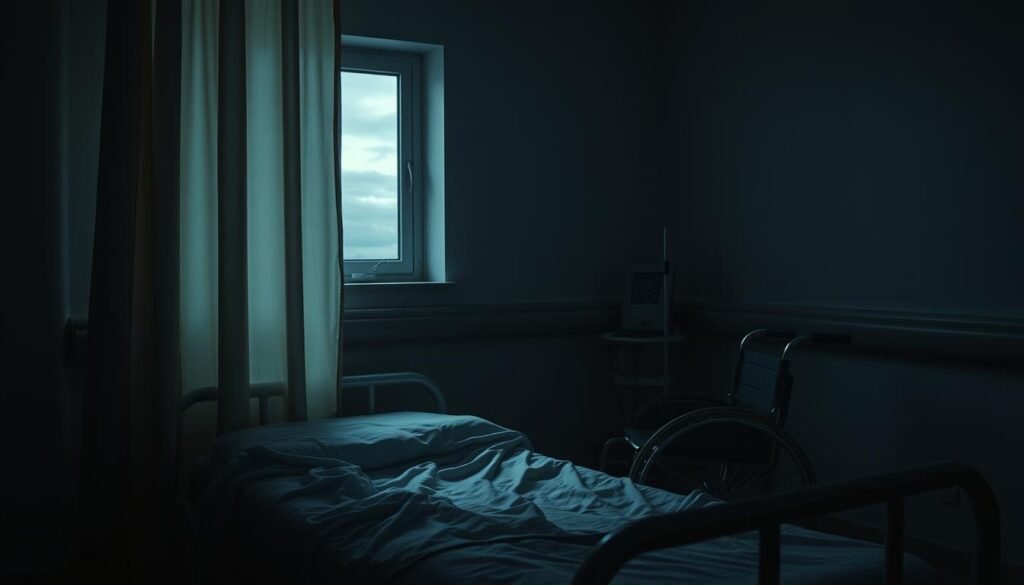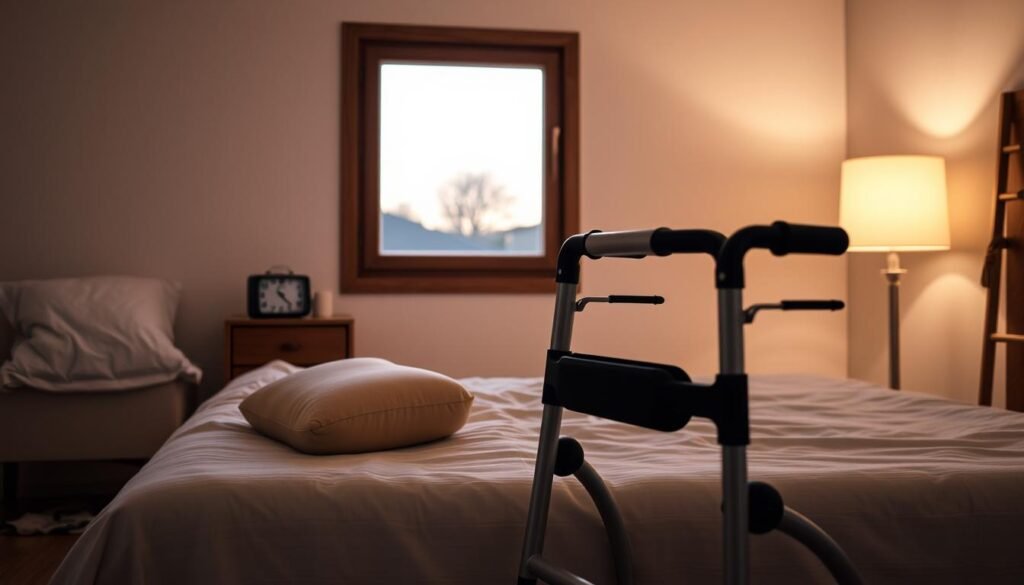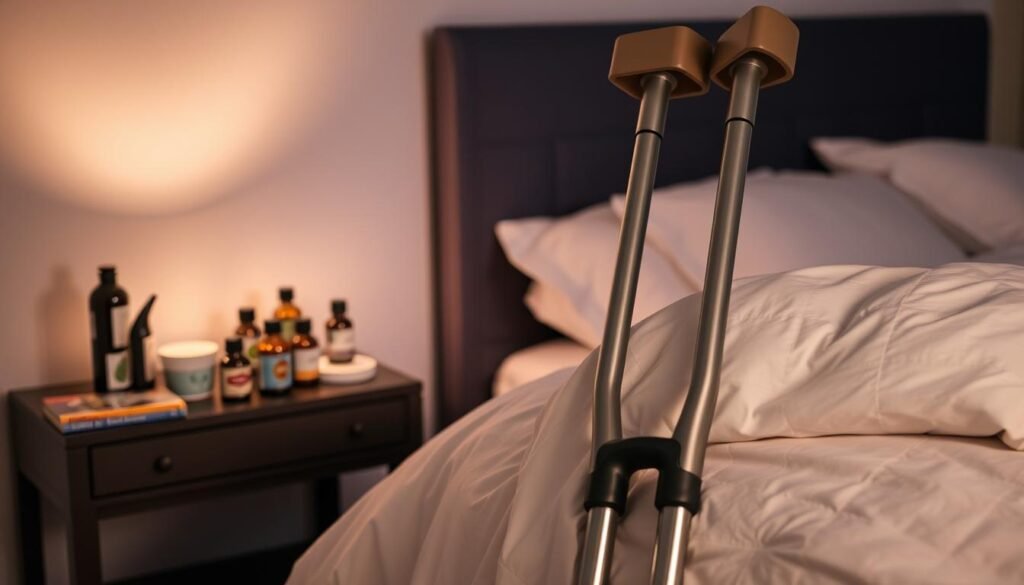About 30% of people have trouble sleeping after knee replacement surgery. This shows a big problem many patients deal with while recovering. Insomnia after this surgery is complex, mixing medical, psychological, and environmental causes. Pain after surgery is a big reason why sleep can be hard to come by.
Recovery starts with discomfort. Studies show sleep problems can start by day four after surgery and last weeks. Nerve blocks used in surgery help with pain for only 18 to 30 hours. After that, patients face changing pain levels and more swelling, affecting sleep. Knowing about these sleep issues is important. It helps in making plans to get better sleep while recovering.
Key Takeaways
- 30% of individuals face sleep difficulties post knee replacement surgery.
- Postoperative pain is the primary reason for sleep disturbances.
- Patients may experience insomnia starting as early as day four after surgery.
- Nerve blocks during surgery provide temporary pain relief.
- Inflammation and swelling can exacerbate sleep challenges.
- Effective management of pain is critical for improving sleep quality.
Understanding Insomnia Post-Surgery
Many people find it hard to sleep after big surgeries like knee replacements. About 75% of patients who had Total Knee Arthroplasty experienced insomnia. The most common issue was difficulty staying asleep, leading to poor quality sleep.
Several factors cause this insomnia. Pain is a big issue for 40.1% of patients. Anxiety and depression also impact 31.3% of patients. Other health issues and noisy environments make it harder to rest. This mix of problems makes sleeping well during recovery tough, especially in the middle stage.
Those facing post-surgery insomnia tend to have a harder time recovering. They feel more pain, stay in the hospital longer, and face more rehab challenges. Changes in how active they are after surgery also play a big role in sleep issues. This means recovery plans need to be personalized.
A large number, 83.6%, of these patients are women, with an average age of 64.2 years. It’s crucial to know how insomnia affects this group. Managing pain well, following medication guidelines, and good sleep habits are key to improving sleep after surgery.
What Causes Insomnia After Knee Replacement Surgery
Understanding what leads to insomnia can make recovery smoother. After knee surgery, sleep can be hard to come by. Pain and the effects of medicine are big reasons for this.
Postoperative Pain
Pain after surgery is a big reason why sleep can be elusive. It can hurt for weeks, or even months. This makes finding a comfy spot to sleep tough.
As patients get more active, the pain can get worse. This makes it even harder to get good sleep.
Medication Side Effects
Meds are key for managing pain after surgery. Patients often use strong painkillers. These can mess with sleep cycles, though.
As painkillers are reduced, pain at night can increase. This can make sleeping well very difficult.
| Factor | Impact on Sleep |
|---|---|
| Postoperative Pain | Discomfort lasting for weeks to months, causing difficulties in finding a comfortable sleeping position. |
| Narcotic Pain Medications | Effects on natural REM cycles can lead to insomnia and disrupted sleep patterns. |
| Tapering Off Medications | Increased pain at night, leading to a vicious cycle of insomnia. |
Looking at both pain and medicine side effects is crucial in understanding insomnia after knee surgery. Tackling these issues is key to better sleep and recovery.
The Impact of the Hospital Environment
The hospital setting is key to how well patients sleep after surgery. There are many things in a hospital environment that affect sleep. This makes getting good rest hard. Noise from devices, rounds by medical staff, and other patients can disturb peace. These factors make it hard for patients to fall and stay asleep. They add to the sleep problems after surgery many have.
Not just noise, but too much light can mess with sleep too. Nighttime artificial light can make falling asleep hard. It can also make staying asleep tough. Hospital rules that require many checks add to the problem. These things can lead to not getting enough sleep, even after going home.
Research shows that 10% to 15% of adults have ongoing insomnia. Insomnia after surgery is also common. A stressful hospital stay can cause short and long-lasting sleep issues. This is if these issues aren’t properly handled.
To make sleep better after surgery, we must tackle what causes the disturbances. By making changes to reduce noise and light and create a calmer setting, we can improve patient recovery.
Emotional Factors: Anxiety and Depression
Understanding how feelings like anxiety and depression affect sleep is key for knee surgery recovery. Patients often struggle with these issues, which can hurt their sleep and well-being.
The Role of Anxiety in Recovery
Many patients feel anxious after surgery. They worry about pain, healing, and getting back to normal. About 40% of adults feel highly anxious around the time of surgery. This anxiety can cause insomnia, making it hard to fall and stay asleep. Worries about recovery play a big role in sleep problems.
Depression Symptoms After Surgery
Depression is also a big issue after knee surgery. Around 2.72% of patients might get diagnosed with depression within a year. Some studies found that 76% of people feel mildly depressed three months after surgery. And 15% still feel depressed six months later. Being less mobile can make patients feel alone, worsening depression. Sometimes, anesthesia can also lead to temporary depression. That’s why it’s crucial to keep an eye on mental health during recovery.

| Study | Key Findings |
|---|---|
| 2021 Study on Knee Replacement | 2.72% diagnosed with depression within one year |
| 150-Person Study | 76% experienced mild depression symptoms at three months |
| Depression Symptoms | 15% continued symptoms six months post-procedure |
| Pain Levels | Over 50% of individuals wake up with pain affecting sleep |
| Physical Activity | Regular activity improves mental health post-surgery |
Physical Discomfort and Sleep Positions
After knee surgery, finding a comfy way to sleep can be tough. Many deal with insomnia during their knee replacement recovery. This is partly because they can’t sleep in their usual positions. For the first 6 weeks, doctors say not to sleep on your stomach or the operated side. This helps avoid more pain and swelling. Sleeping on your back, with pillows under your calf and knee, is better. It helps with blood flow and lessens discomfort.
Surgery can cause swelling and limit how much you can move. This makes it hard to find a good sleep position. The pain and need to change how you sleep can mess with sleep quality. Things like therapy or relaxation methods can make sleeping easier during recovery.
Getting why physical pain affects sleep positions after knee surgery is key for a smoother recovery. Below is a table of the best sleep positions during this time:
| Sleep Position | Recommended Duration | Benefits |
|---|---|---|
| On Back | 3-6 weeks | Reduces pressure on the knee, promotes blood flow |
| Non-Operative Side | 3-6 weeks | Allows comfortable sleep without straining the surgical site |
| Stomach | Avoid | Can lead to increased pain and swelling |
Changes in Activity Levels
After knee surgery, changing how active you are can strongly affect your sleep. Right after surgery, patients usually move from doing little to doing more through physical therapy. This increase in activity can cause more physical discomfort, especially when they stop taking pain meds.
About 54% of people had trouble sleeping after knee surgery. This shows a clear connection between activity levels and how well you sleep. They had an average sleep score of 6.7±3.0, showing many had issues with sleeping well.
Physical therapy is vital for healing, but it might make sleeping harder. This often happens when therapy starts to challenge the body more. Activities like walking may cause pain, which can make it hard to get good sleep.
Being more active can make sleeping comfortably tough. An average score for pain while lying down was 5.8±1.8. Studies show that improving how well you function can help you sleep better as you heal.

It’s important to find a good balance between being active and sleeping well after knee surgery. For extra information on how sleep changes after surgery, check out this study.
Medication-Related Issues
Many people struggle with medication-related insomnia after knee surgery. Painkillers and other drugs can harm sleep quality. Narcotic medications might lead to dependency and painkillers side effects, causing withdrawal symptoms.
About 50% of patients report sleep problems after surgery. A wide range of drugs, including pain relievers and antidepressants, can affect sleep. It’s key to know which drugs affecting sleep quality during recovery.
As patients reduce medication use, they often see sleep improvements. This can be a rewarding but tough process. Looking into other pain management ways can help avoid medication-related insomnia. It makes getting better sleep easier.
If you want to learn how different medications impact sleep, check out medications that may cause insomnia.
The Effects of Age on Sleep Quality
As people get older, their sleep quality often gets worse. Older adults commonly face problems that lead to less sleep. This includes changes in sleep patterns and more difficulty sleeping after surgery. Understanding these issues is important for older patients.
Age-Related Sleep Changes
Research shows older people often struggle with sleep problems. This seriously affects their quality of life. Studies have found older people’s sleep differs from younger people’s in several ways. Some key differences are:
- Decreased REM Sleep: Older adults may experience less REM sleep, which is key for thinking clearly and controlling emotions.
- Prolonged Wakefulness: They may stay awake longer after first falling asleep, breaking up their sleep.
- Increased Sleep Latency: It can take longer to fall asleep, which can be frustrating and lead to insomnia.
Surgical patients, in particular, may have even worse insomnia because of aging. Sleep disorders are very common before surgery, affecting 8.8–79.1% of patients. This shows how important age is in influencing sleep quality.
The Connection Between Pain and Sleep Disruptions
Chronic pain affects how patients recover from knee surgery. It leads to pain and sleep disruption. This makes it hard to stay asleep and affects recovery and well-being. Pain and stress from not sleeping add to more tiredness and emotional stress.
Studies show sleeping troubles after surgery can last from days to weeks. Yet, most patients see their sleep improve within a week. EEG studies prove that sleep changes significantly for the first six nights post-surgery. Then, it slowly gets better.
Managing pain after surgery is key. It helps with discomfort and sleep. Strategies include a calming sleep setting and non-drug treatments. Also, recommended sleep aids should be considered. Relaxation and good sleep habits are crucial to lessen pain’s impact on sleep.
For more details on how pain and insomnia interact after knee surgery, look into the Journal of Orthopaedic Surgery. It shares important insights. Understanding this helps in caring for patients better. This ensures they get the healing sleep needed for recovery.
Sleep Aids and Their Impact
Sleep aids are very helpful after surgery. They help with sleep problems that usually happen in the first six nights. You can find over-the-counter options like Melatonin and Benadryl. However, each person reacts differently to them. It’s crucial to talk to a doctor before trying any sleep aids. This is to ensure they won’t mess with your pain medication.
Zolpidem is a prescription medication noted for its effectiveness. Studies show that patients who took Zolpidem felt less pain. They also needed fewer painkillers after operations like knee arthroplasty. Better sleep from Zolpidem means better recovery overall. But, listening to a healthcare professional is important when using these drugs. This helps to avoid the risk of becoming dependent on them.
Using sleep aids after surgery can make your sleep better. This makes the whole surgery experience better too. Over-the-counter aids may help at first. But, for long-term improvement, Cognitive Behavioral Therapy is a good choice. It helps you develop better sleep habits and feel better emotionally. Knowing how sleep aids work helps patients make smart choices after surgery.

Tips for Improving Sleep Quality After Surgery
Improving your sleep after knee surgery is crucial for healing. You can try different ways to sleep better. For instance, making a consistent sleep schedule helps. You go to bed and wake up at the same times every day. This helps your body get back to a healthy sleep rhythm.
Making your bedroom comfy is key. Keep it dark and quiet to avoid distractions. A calm environment helps you sleep better. It’s also important to be aware if you had sleep issues like sleep apnea before surgery. These issues could affect your sleep more after the surgery.
Controlling pain is essential for good sleep. Make sure to take your pain medicine as instructed. Using ice packs before bed can also lower pain.
Try not to nap during the day. Even short naps can mess up your night sleep. Choose calming activities before bedtime. Avoiding exercise late at night is smart because it can make you too alert. Also, cut down on caffeine before bed. It can stop you from falling asleep.
Following these sleep tips after surgery is important. They help you heal by improving your sleep. Good sleep practices reduce risks after surgery and lead to better health overall.
Common Misconceptions About Post-Surgery Sleep
Many people get it wrong about sleep after surgery. They think trouble sleeping is just because of the surgery itself. That’s not the full story. Worries and feeling low can also make it hard to sleep well. Knowing these myths of recovery helps in healing better.
Health experts say it’s key to tackle wrong beliefs about sleep after surgery. These false ideas can make anxiety worse. Plus, not knowing how long insomnia lasts sets up false hopes. Insomnia affects many, with short bursts lasting only a few nights. But it can also drag on for weeks or even longer.
Addressing sleep myths is crucial, especially for older folks. They’re more likely to have sleep issues. Bad sleep habits, some medicines, and mental health can make insomnia worse. It helps to keep a regular bedtime and cut down on caffeine. Teaching patients that cognitive therapy and lifestyle changes can manage insomnia is key. This improves their recovery a lot.
Knowing these facts fights the myths of recovery that cause worry. For those wanting to learn how their surroundings affect sleep, check out this article. It shares insights on noise and sleep.
Conclusion
Insomnia after knee surgery is a tough challenge. It comes from pain, side effects of medication, emotional stress, and the hospital setting. It’s key for patients and their helpers to understand what causes insomnia in this situation. Studies show that about half of the people who have knee surgery experience trouble sleeping, especially one month after the operation. However, it gets better over time.
To improve recovery from knee surgery, it’s important to manage pain and look after emotional health. This helps make sleep better, which is crucial for healing. Starting rehab early and keeping an eye on sleep habits can lessen discomfort and help recovery go smoothly.
Knowing how pain, medication, and sleep connect can help patients recover better. Ongoing sleep problems after surgery can slow down recovery and lower patient happiness. So, it’s very important to use methods that help improve sleep after getting knee surgery.